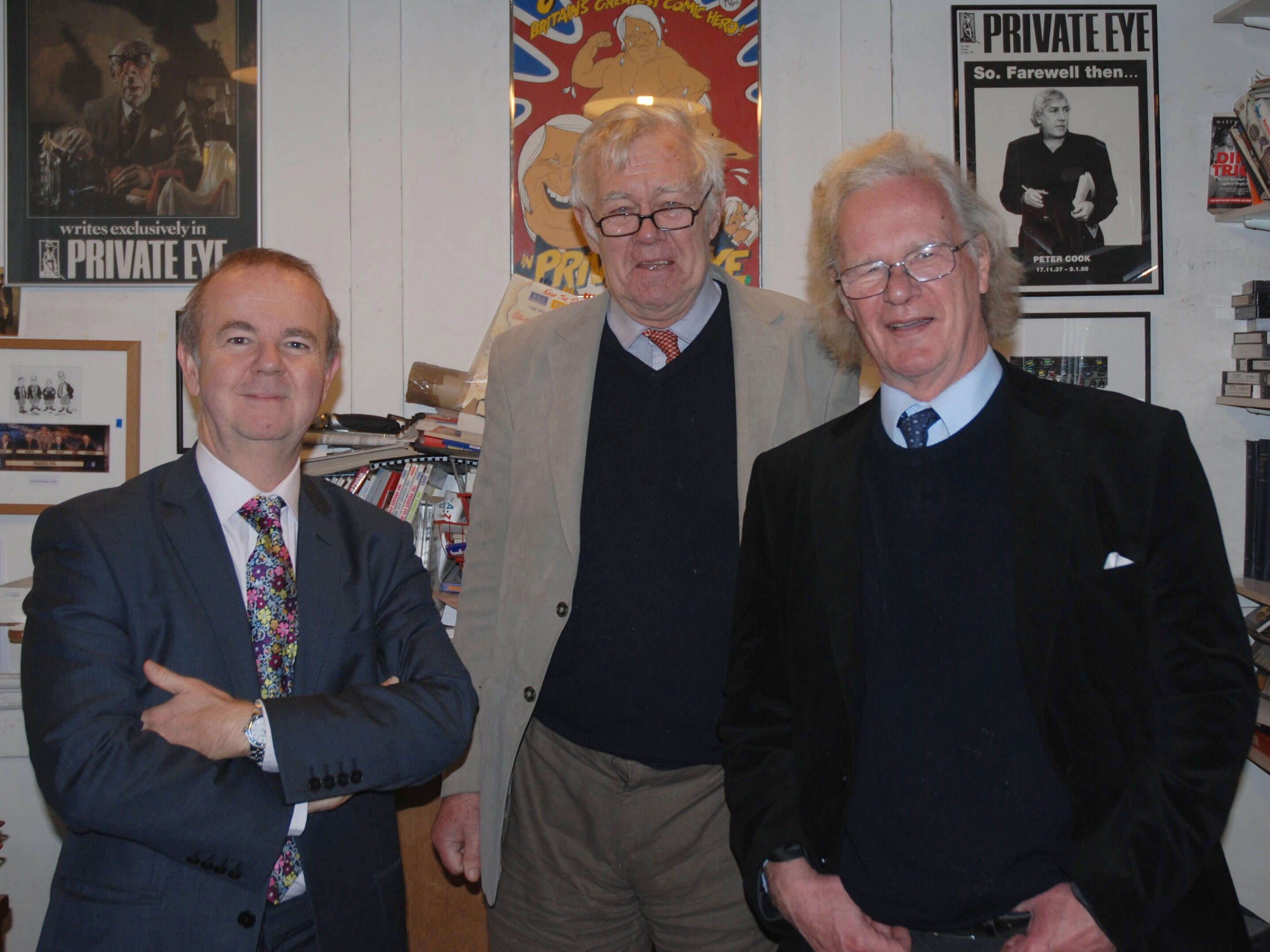
Christopher Booker, the first editor of Private Eye and a long-serving Telegraph columnist has died aged 81 after a short battle with cancer.
Booker (pictured, right) co-founded the satirical magazine in 1961, becoming its first editor and remaining associated with it for many decades.
He also wrote regular columns for the Sunday Telegraph from 1990 until March this year when he stepped down for health reasons.
News of his death was announced today by Private Eye on Twitter.
The magazine said: “We are very sad to announce the death today of Christopher Booker, author, journalist, satirist and the first editor of Private Eye, after a short illness. He was 81.
“A full appreciation of his life and contributions to the magazine will be published in a future edition.”
Booker founded Private Eye with his school friends Richard Ingrams (pictured, centre), who became its second editor, and cartoonist William Rushton.
He continued to contribute to almost every issue of the magazine until he became ill at the end of 2018, a feat which the magazine’s current editor Ian Hislop (pictured, left) described as “extraordinary”.
Hislop, who described his predecessor as a “very funny man” and “fantastically well read and clever”, told Press Gazette: “He was the thread throughout the magazine for the whole of his career.
“The brilliant thing about Christopher is his stuff was always fact-based jokes. He was a great one for using humour as a way of understanding the real world. He was a real satirist. He wasn’t a surrealist or someone who was given to flights of fancy.”
Booker’s stamp was on many of Private Eye’s regular formats, with memorable mentions from Hislop including the Secret Diary of John Major, Gordon Brown as a communist leader, Cameron and Clegg as joint headmasters of the coalition academy, and the fake apologies.
Hislop added: “He always said ‘I’m not going to retire, I’m just going to carry on doing this – if I was here to do anything, I was here to make jokes about British public life’.”
An obituary of Booker published this afternoon on the Telegraph website described him as a “sceptical, brave, wide-ranging and often funny campaigning journalist” who “built a following of millions of loyal newspaper readers” through its Sunday title.
Sunday Telegraph editor Allister Heath said: “Mr Booker was one of the great social critics of his generation, and one of the leading campaigning journalists of the post-war era.
“We are honoured to have published him and, on behalf of everyone at The Telegraph, we send our condolences to his family and to all those who knew him.”
Booker reviewed jazz music for the Daily Telegraph while still at university and went on to become jazz critic at the Sunday Telegraph with its launch in 1961.
From 1988 to 1990 he also penned the Way of the World column for the Daily Telegraph before, as he wrote “I mocked the irascible Auberon Waugh” who then demanded the column for himself. Booker agreed a swap for Waugh’s regular Sunday slot.
As well as his columns he also reviewed books for the Sunday Telegraph. He wrote several himself including The Neophiliacs – on the revolutions of the Fifties and Sixties – which was serialised in the Sunday pages in 1969.
In his final Sunday Telegraph column, Booker wrote: “We are told we should try to leave the world in slightly better shape than we found it. But as I prepare to leave it, I have too long felt that I was no longer trying to change it and was only writing its epitaph.
“Nevertheless I cannot forget all the thousands of admirable people I have come across through my years writing for the Telegraph. To them and all my loyal readers I am profoundly grateful.”
Messages of tribute have been shared on Twitter this afternoon.
Tim Stanley, the Daily Telegraph’s leader writer, wrote: “Goodbye Christopher Booker. He changed your world without perhaps you knowing: first editor of Private Eye, campaigning columnist, godfather to the Eurosceptic movement.”
The Sun’s senior legal counsel Adam Cannon, who legalled Booker’s column for six years, said: “Whilst sometimes a challenge, he was an absolute delight to deal with and will always remember him for his wonderful good humour and great anecdotes.”
Parliamentary sketchwriter Quentin Letts described Booker as “magnificently bloody-minded and non-compliant”.
Picture: Private Eye/PA Wire
Email pged@pressgazette.co.uk to point out mistakes, provide story tips or send in a letter for publication on our "Letters Page" blog
